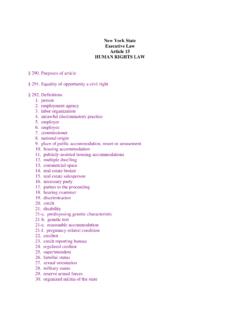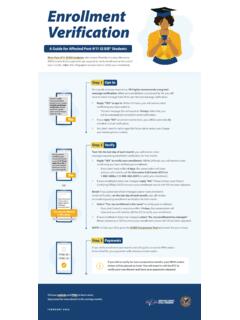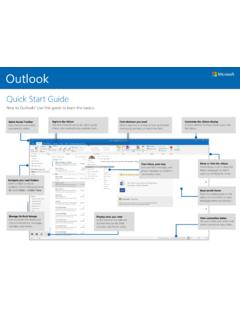Transcription of FREQUENTLY ASKED QUE STIONS FILING A COMPLAINT at …
1 FILING A COMPLAINT at the DIVISION If you believe that you have been sexually harassed, you can file a COMPLAINT with the New York State Division of Human Rights. For harassment occurring prior to August 12, 2020, the COMPLAINT must be filed with the Division within one year of the alleged discriminatory act. To file a COMPLAINT : Visit the Division s website, at , and download a COMPLAINT form. Completed complaints should be signed before a notary public and returned to the Division by email, fax, postal mail or in person. Stop by a Division office in person. Contact one of the Division s offices, by telephone or by mail, to obtain a COMPLAINT form and/or other assistance in FILING a COMPLAINT . For more information or to find the regional office nearest to you visit the Division s website You can also call the Division s toll-free HOTLINE at 1-888-392-3644. Your COMPLAINT will be investigated by the Division, and if the Division finds probable cause to believe discrimination has occurred, your case will be sent to a public hearing.
2 There is no fee charged to you for these services. If the Commissioner of Human Rights finds in your favor following the hearing, the relief awarded to you may include such remedies as a cease-and desist order, requiring a change in practices, and/or monetary compensation for the harm you suffered. FREQUENTLY ASKED QUESTIONS Do I need to file an internal COMPLAINT about a hostile work environment before I file with the Division? No. New protections under the Human Rights Law make it clear that the fact that you did not complain to your employer does not determine whether your employer will be held responsible. You may wish to complain to your employer so that a situation may be remedied, but it is not required under the Human Rights Law. Is a single incident of inappropriate sexual behavior enough to be sexual harassment and can I file a COMPLAINT ? Yes. Harassment does not need to be repeated for you to file a claim; a single incident can be sufficient.
3 Harassment also does not need to be severe or pervasive in order for the employer to be liable. Contact the New York State Division of Human Rights to file a COMPLAINT . What if my employer retaliates against me for FILING a COMPLAINT ? New York s Human Rights Law prohibits retaliation, either for FILING an internal COMPLAINT with your employer and/or for FILING a COMPLAINT with the Division. If you feel you are a victim of retaliation, you should contact the Division and file a COMPLAINT . SEXUAL HARASSMENT ONE FORDHAM PLAZA BRONX, NEW YORK 10458 1-888-392-3644 TTY: 718-741-8300 submission to, or rejection, of such conduct is used as a basis for decisions affecting one s employment; or such conduct has the purpose or effect of interfering with an individual s work performance, or creating an intimidating, hostile or offensive working environment. SOME STEPS YOU MAY CONSIDER IF YOU ARE BEING SEXUALLY HARASSED Keep a Diary.
4 Write down what is happening to you. Include direct quotes, patterns of the harassment, and names of witnesses. Save any letters, cards or e-mails sent to you. Keep both the diary and notes in a secure place, preferably at home. Speak to Your Supervisor. If the harasser is your supervisor, speak to his or her supervisor. Keep notes concerning this contact, including dates, nature of the conversation, and any follow-up. Report the Offensive Behavior. Report the conduct to your employer through the Affirmative Action Administrator, Personnel Director, EEO Officer, Union Representative, or any other person designated to handle sexual harassment complaints. Keep notes concerning this Contact, including dates, nature of conversation, and any follow-up. Ask Other People. Find out from others who work with or near the harasser if they have ever been harassed, or if they know of anyone who has been or may have been harassed.
5 Although you may wish to take the above actions, you may file a COMPLAINT with the Division of Human Rights even if you have not taken these steps. SEXUAL HARASSMENT IS AGAINST THE LAW In 2019, Governor Andrew M. Cuomo signed legislation that greatly expanded the scope and protections offered by the New York State Human Rights Law and which strengthen victims rights in the fight against harassment. Sexual harassment is prohibited as a form of sex discrimination under the New York State Human Rights Law as well as other federal and local laws. This unlawful conduct may occur in many contexts, including employment, housing, educational institutions, or places of public accommodations. Most often sexual harassment occurs in the workplace. The sexual harassment provisions apply to ALL employers in New York State, regardless of the number of employees. NEW PROTECTIONS FROM HARASSMENT Starting on October 11, 2019, the Human Rights Law now protects victims of harassment, including sexual harassment, in important new ways: Harassment is against the law whenever an individual is subjected to inferior terms, conditions or privileges of employment.
6 The harassment need not be severe or pervasive in order for the employer to be liable. (However, it must rise above petty slights or trivial inconveniences ) In order to establish liability, the complainant does not have to identify a similarly situated person/employee that was treated more favorably. A complainant does not have to complain to their employer or file a formal grievance in order to establish liability. The above provisions are effective for alleged discrimination occurring on or after October 11, 2019. STATUTE OF LIMITATIONS EXTENDED The legislation also gives victims of harassment a longer time period to file complaints with the Division of Human Rights. Starting on August 12, 2020, the statute of limitations for FILING a sexual harassment COMPLAINT with the Division is extended from one year to three years. (Complainants currently have three years to bring a case under the Human Rights Law directly in court.)
7 SEXUAL HARASSMENT IN THE WORKPLACE Sexually harassing conduct can consist of unwanted verbal or physical sexual advances, sexually explicit statements, or discriminatory remarks that are offensive or objectionable to the recipient. Examples include: Requests for sexual favors, which may be accompanied by implied or overt threats concerning one s job performance evaluation or promotion. Subtle or obvious pressure for unwelcome sexual activities. Verbal harassment or abuse in the form of a pattern of sexual comments or questions. Unnecessary or inappropriate physical contact. Displays of lewd photographs or drawings. Unwelcome sexual advances, requests for sexual favors, and other verbal or physical conduct of a sexual nature constitute unlawful sexual harassment when: submission to such conduct is made (either explicitly or implicitly) a term or condition of employment.













